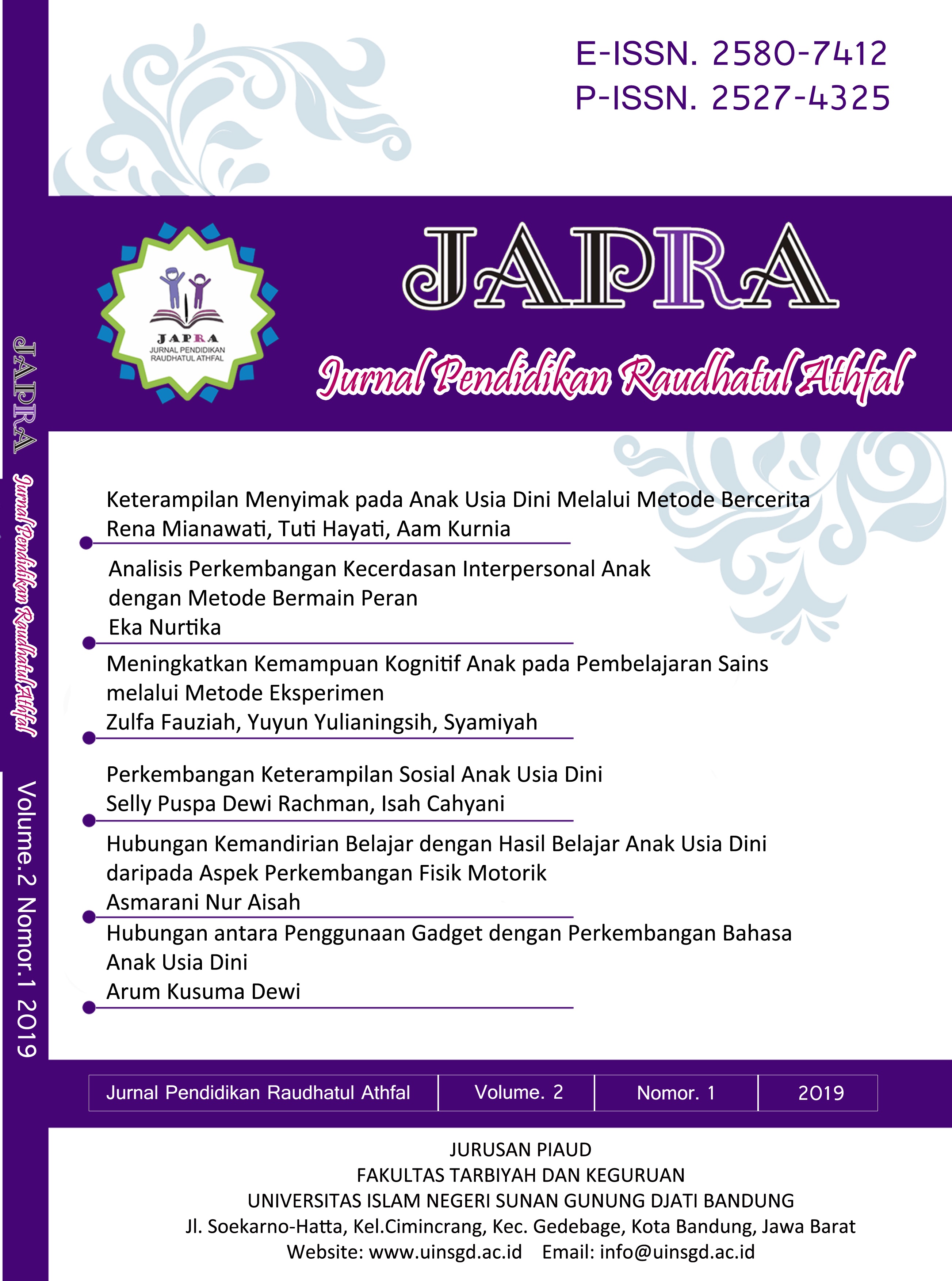Meningkatkan Kemandirian Anak Melalui Kegiatan Practical Life Skill
DOI:
https://doi.org/10.15575/japra.v3i1.8105Keywords:
Anak Usia Dini, Kemandirian, Practical Life Skill, Early childhood, IndependenceAbstract
Preliminary observations were made on children of group A RA Yapata Al-Jawami that children's independence was still low. This is evident in the eating activities still assisted by parents or school teachers. The purpose of this study is to find out the application of practical life skills activities to improve children's independence. The method used is classroom action research. These methods include: planning, action, observation and reflection. Techniques for collecting data through observation, performance and documentation. The results of the study that the independence of children before being applied to practical life skills activities obtained an average value of 44.76 with very few criteria. The application of practical life skills activities to improve children's independence has increased. This can be seen from the activity of the teacher in the first cycle obtained an average value of 71.5% with sufficient criteria and in the second cycle obtained an average value of 88.72% with very good criteria, while the activity of children in the first cycle obtained a value an average of 58.95% with less criteria and in the second cycle obtained an average value of 76.82% with good criteria. Furthermore, the independence of children in practical life activities, namely cycle I obtained an average value of 55.94 with less criteria and in the second cycle obtained an average value of 75.35 with good criteria. Thus the proposed hypothesis is accepted, meaning that practical life skills activities can improve children's independence.
References
Arikunto, S. 2012. Penelitian Tindakan Kelas. Jakarta: PT Bumi Aksara
Aqib, Z. 2009. Penelitian Tindakan Kelas. Bandung: Yrama Widya
Hayati, T. 2013. Evaluasi Pembelajaran. Bandung: CV Insan Mandiri
Komala (2015) Mengenal dan Mengembangkan Kemandirian Anak Usia Dini Melalui Pola Asuh Orang Tua dan Guru. Tunas Siliwangi Volume 1 No. 1 Oktober
Permendiknas No. 58 Tahun 2009 tanggal 17 September 2009 Tentang Standar Pendidikan Anak Usia Dini
Permendiknas No. 20 Tahun 2003 tanggal 8 Juli 2003 Tentang Sistem Pendidikan Nasional
Purwanto, N. 2009. Prinsip-Prinsip dan Teknik Evaluasi Pengajaran. Bandung: PT Remaja Rosdakarya
Rakhma, E. 2017. Menumbuhkan Kemandirian Anak. Jogjakarta : CV. Diandra Primamitra Media
Rohmah, T. 2009. Meningkatkan Kemandirian Melalui Kegiatan Practical Life. Jurnal PG-PAUD, Universitas Negeri Surabaya.
Susenu, D. D. (2011) Hubungan Antara Pola Asuh Orang Tua Dengan Kemandirian Anak Usia dini Pra Sekolah Di TK Aisyiah Mendungan Sukaharjo. Jurnal PG- PAUD, Volume 2, Nomor 1 April
Sanjaya, W. 2009. Penelitian Tindakan Kelas. Jakarta: Kencana
Sugiyono. 2015. Metode Penelitian Kuantitatif dan Kualitatif dan R&D. Bandung: ALFABETA CV.
Sugiyono. 2018. Metode Penelitian Kombinasi (Mixed Methods). Bandung: ALFABETA CV
Syah, M. 2012. Psikologi Belajar. Jakarta: Raja Galindo Persada.
Yusuf, S. 2008. Psikologi Perkembangan Anak dan Remaja. Bandung: Remaja Rosdakarya
Zuriah, N. 2007. Metode Penelitian Sosial dan Pendidikan. Jakarta: PT Bumi Aksara.
Downloads
Published
Issue
Section
License
Authors who publish with this journal agree to the following terms:
- Authors retain copyright and grant the journal right of first publication with the work simultaneously licensed under a Attribution-ShareAlike 4.0 International (CC BY-SA 4.0) License that allows others to share the work with an acknowledgment of the work's authorship and initial publication in this journal.
- Authors are able to enter into separate, additional contractual arrangements for the non-exclusive distribution of the journal's published version of the work (e.g., post it to an institutional repository or publish it in a book), with an acknowledgment of its initial publication in this journal.
- Authors are permitted and encouraged to post their work online (e.g., in institutional repositories or on their website) prior to and during the submission process, as it can lead to productive exchanges, as well as earlier and greater citation of published work (See The Effect of Open Access).
